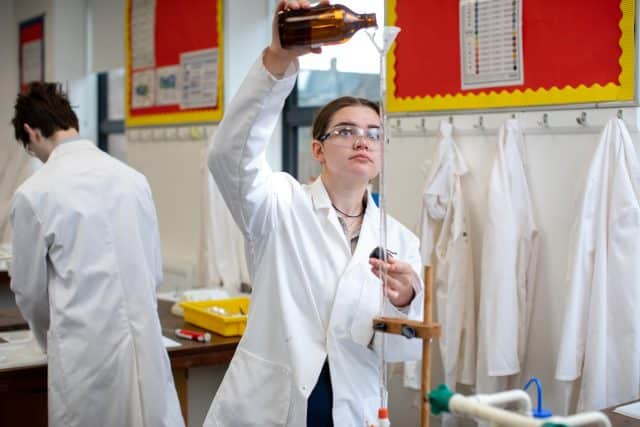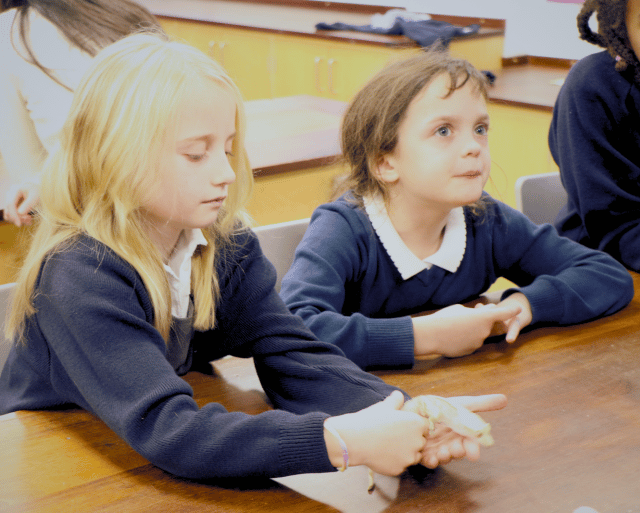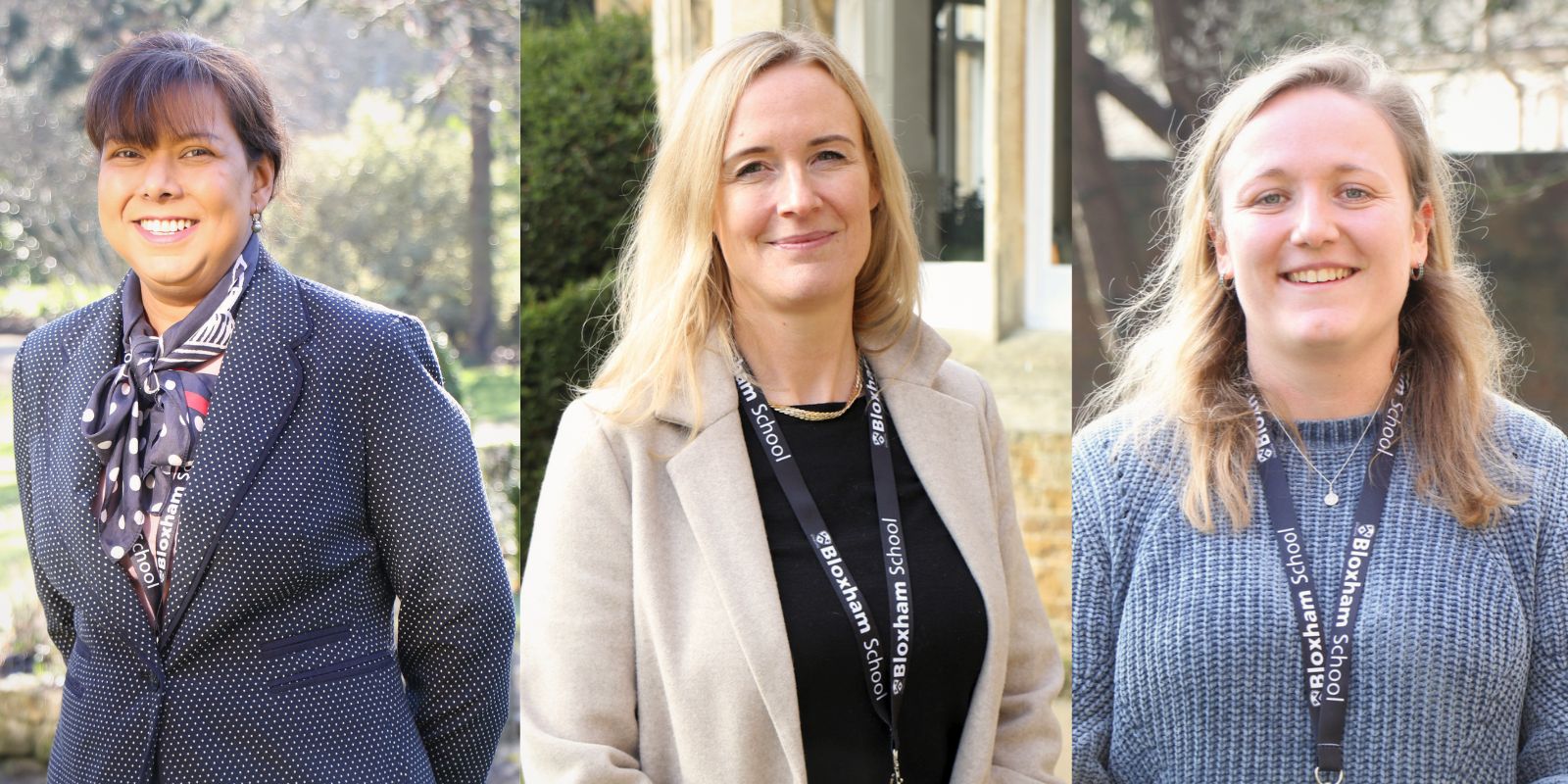For International Day of Women and Girls in Science, we interviewed three of our fantastic female science teachers and some of the young women in whom they have inspired a love of the sciences. It was particularly lovely to speak to girls who are planning to pursue a degree and then career in scientific fields.

Teachers
When you were at school, what made you first fall in love with science and then choose to study it at university?
Cheryl Linton (Physics): I grew up in the Irish countryside and one of the benefits was that the night sky was pitch black with very little light pollution. As a child, I was able to see the Milky Way and was fascinated by the night sky. Luckily, there was a planetarium and observatory close to where I lived, and I would regularly visit to learn more about the stars and planets; you might say I was hooked on anything to do with space. I ended up getting four weeks of work experience at the observatory whilst I was doing my A Levels and knew that was what I wanted to study at University. I was offered a place at Edinburgh University to study Astrophysics. It was a fantastic place to study, although the 9am lectures at the observatory were a struggle at times as you had to climb a massive hill to get up there!
Rehana Rostron (Biology): That happened when I was about 6 or 7. I was always asking questions as a child, like why is the sky blue and why is the grass green? I had an inquisitive mind. My brother is a physicist, and one day he took me to the kitchen and put some water in a frying pan and it disappeared into the air. He said, “That’s science!” and I just loved it from a young age. When I was in my first year of secondary school, they started a programme called British Association of Young Scientists. I would go to lectures with my parents and I found them amazing. I loved all the sciences, not just biology. It was a natural choice to carry it on for university. I did all three sciences for A Level and found it very hard to choose between them! If I could go back, I’d do a degree in all of them.
Phoebe Clarke (Chemistry): From early on in my time at school, I found that the sciences came more naturally to me due to their predictable nature and connection to current affairs. I had a slight ego complex growing up and enjoyed excelling academically. I saw science as a means to enhance people’s lives in a variety of ways and I have always been keen on helping others. I was particularly engaged with the rising awareness of climate change and how the sciences could help combat the problems being faced by various populations across the globe. On a more niche note, I also enjoyed applying sciences to human performance in sport and reading about the science behind training programmes and eliciting adaptations in the body.
How do you inspire students to pursue the sciences?
Cheryl Linton: I always aspire to keep my lessons relevant to what is going on in the world around us and how science helps us with our daily lives. I am particularly keen to discuss topical issues in science, whether it’s a breakthrough in cold fusion or developments in space exploration.
Rehana Rostron: I think my own passion and enthusiasm come across and I hope that inspires the pupils I teach. I’m amazed by how much we still don’t know, particularly when it comes to medical things. When I was younger, I would always read the New Scientist and Scientific American and Nature, which is one of the best-selling science journals ever. I still try to learn new things and then bring that into my lesson. It might not be on the course, but if you relate science to everyday life, it makes it easier.
Phoebe Clarke: I aim to focus on the enjoyment of the subject without the pressure of placing a significant purpose to studying it. Science is enjoyable because it helps you understand the world, it provides a plethora of transferrable skills, and it allows you to interact with the world around you. I find pupils engage most when I connect the dots between something abstract and something in the real world, for example, talking about structure and bonding and linking it to a real life scenario. The current climate crisis has triggered a greater level of interest and emotional reaction from pupils as they want to feel empowered to help resolve the issue. As I have taught these topics over the past year it has been a poignant reminder of my first initial engagement and desire to access the sciences.
In your opinion, why is it so important to encourage more girls to enter into science-based career paths?
Cheryl Linton: It is vitally important that both girls and boys can be successful in science. You have to be passionate about whatever you choose to study at this high level, but there shouldn’t be any barriers, including gender inequalities, when following your path. Traditionally, Physics is seen as a male-dominated field, but there are many female physicists making their name, especially in particle physics and astrophysics.
Rehana Rostron: I think things are getting better when it comes to girls choosing degrees in science. The number of female scientists is growing. I think it’s all to do with inspiring them when they’re young, at primary school really. If you have a really good Key Stage Two programme in the primary schools, that’s enormously helpful. That’s why I like that we do Animal Club with the local primary school children here at Bloxham. It’s giving them
 an in and I think that helps get girls interested in science from a young age. Older girls often like Biology but are less sure about Chemistry and Physics, and we need more female chemists and physicists. Biology is perhaps easier to get into because we’re learning about ourselves. We need to encourage all three sciences.
an in and I think that helps get girls interested in science from a young age. Older girls often like Biology but are less sure about Chemistry and Physics, and we need more female chemists and physicists. Biology is perhaps easier to get into because we’re learning about ourselves. We need to encourage all three sciences.
Phoebe Clarke: I didn’t have any female science teachers until I started A Levels which I hadn’t reflected on as a significant issue until later on. I didn’t find it a hinderance, but I could see around me that the majority of my A Level classes (in the sciences) were male heavy despite my female peers being equally successful at GCSE Science. The girls in the class were there to study medicine alone. I’m unsure whether having a female science teacher early on in our school lives would have altered the ratio. The closer industries are to having a balanced and representative demographic of the real world the more effective they can be. Regardless of that fact, it is a person’s right to access a career path about which they are passionate. The greater diversity of individuals that can be encouraged into careers within science the greater number of problems that can be solved – science is problem solving and fresh minds are needed.
Do you have any particular female role models in science?
Cheryl Linton: I am particularly inspired by a female Astrophysicist, Jocelyn Bell Burrell who, like me, is from Northern Ireland. As a postgraduate student she discovered radio pulsars and her research won a Nobel prize, but she was not credited with the honour due to her status as a postgraduate and also possibly her gender. She went on to become president of the Royal Astronomical Society and in 2018 she was awarded a $3-million cash prize for her previous research on pulsars. She decided to use this money to assist female, minority and refugee students become Physics researchers. What an inspiration!
Rehana Rostron: I find that question a tough one. Probably the woman who contributed to discovering the structure of DNA [Rosalind Franklin]. They talk a lot about Watson and Crick but they never talk about her, and her work was so important for that discovery. I have so many scientists who I look up to, but lots of them are men, like Mendel, the geneticist. When I’m teaching, I try to talk about all the scientists who have made a contribution to that discovery. I look up to lots of women in general who aren’t scientists. I’m reading Michelle Obama’s book at the moment and that’s very inspirational.
Students
One of our Upper Sixth girls, Hannah B., is planning on going to University to read Physics. She shared that,
After university, I want to do my PhD and pursue a career in physics research in photonics or medical physics. I always enjoyed puzzles which evolved into a love of science when I joined Bloxham. I hadn’t done much science before I joined but I loved learning it and found it fascinating.
Katie T. is about to sit her GCSEs, and has discovered a real love of science since joining Bloxham in Third Form. She shares that,
At my last school, I didn’t really like science at all, and when I came to Bloxham in Year 9, I’d never even used a Bunsen burner before, but science is now my favourite subject and I would like to do all three sciences and maths for A-level. I enjoy science so much now because we have some amazing female science teachers who are great role models, and all the teachers are very passionate. I also love how we do practical experiments quite often, and that the work is always challenging in a good way. My favourite female role models in science are Tu Youyou, Marie Curie, Rosalind Franklin, Elizabeth Garrett Anderson and Katherine Johnson (although she was more of a mathematician).
We also chatted to Beatrice L., a Second Form student who, like Katie, has discovered a love of science since joining Bloxham.
I really love how interactive the lessons are. Coming from a primary school where we did no science whatsoever, this was a massive surprise to me in First Form, but the teachers helped everybody get to grips with what was going on. My female role model is Marie Curie. I think her dedication to her work was amazing. She died for science and I find that to be very inspirational.
OBs
We also got in touch with Mollie Paxford, an Old Bloxhamist who now runs her own ecology business, Paxford Ecology.
How did your time at Bloxham first ignite your passion for science generally and ecology in particular?
I grew up with a love for the outdoors and animals, and always knew that was where I belonged. My time at Bloxham fed this. I was encouraged to follow what I enjoyed and I had some very passionate teachers who inspired me.
Were there any teachers or lessons that particularly stick in your mind?
I had several Biology teachers during my time at Bloxham who I was very fond of. Mr Boynes, Mr Noone and Miss Lister were all so passionate and enthusiastic about the subject. Mr Noone often had something crawling around on our desk and I loved how the classroom always felt so relaxed with him. I love the unusual, and I think he and Mr Boynes would probably agree so I found their approach to life very interesting.
Are there many women in your industry? If not, how do you think more women could be encouraged to get involved in ecology?
There are an increasing number of young women joining my industry, but in the upper levels they are few and far between. Ecology can be an incredibly flexible career. Many of us work from home or share offices, and we set our own hours. It isn’t always glamorous, but I would say if you are interested in the outdoors and/or conservation and don’t want to spend every day in front of a computer then give it a go! It wasn’t a topic covered much when I was at school, but by making it more mainstream we could get many more women into the industry.
Do you have any particular female role models in science?
No, I do not. I don’t think there are many women in my industry to look up to. To me, my gender is irrelevant and I have never taken it into consideration. I think some men do, but I just show them I am good at my job and they respect you for that.


